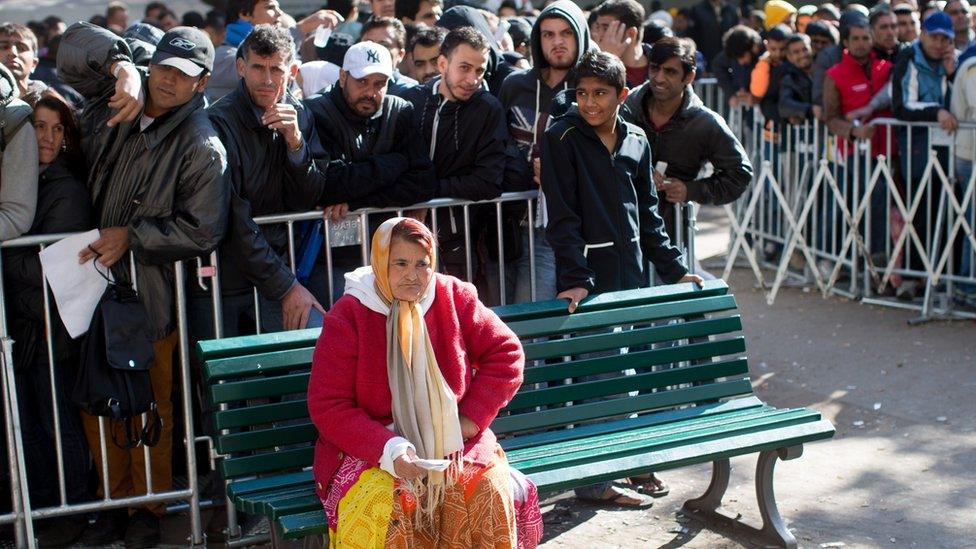Migrant crisis: Germany sees massive drop in asylum seekers
- Published

Although the number of arrivals was down in 2016, the number of applications actually rose
Germany says 280,000 asylum seekers arrived there in 2016, a drop of more than 600,000 on the previous year.
The German interior minister said that the decrease was due to the closure in 2016 of the Balkan route and the migrant deal between the EU and Turkey.
The record influx of 890,000 people came as migrants and refugees travelled through Greece and the Balkans.
They headed for Germany after Chancellor Angela Merkel ordered a temporary open-door asylum policy.
Her decision to suspend EU rules on registering asylum seekers in the first EU state they entered was aimed at the growing number of Syrians fleeing the conflict in their country, but large numbers of people of other nationalities made the journey too.
Read more on Europe's migrant crisis:
Migration has become a heavily politicised issue in Germany ahead of federal elections in the autumn. As voters punished her CDU party in regional polls last year, Mrs Merkel acknowledged that the migrant crisis could have been handled better.
"This shows that the measures that the federal government and the EU have taken are taking hold," said Interior Minister Thomas de Maiziere. "We've been successful in managing and controlling the process of migration."
"It's so cold at night" - Greece's refugee camps have been exposed to sub-zero temperatures
He was referring to the EU's deal with Turkey to halt the influx of migrants and refugees into Greece, as well as the decision by Balkan countries to close off the route towards Western Europe.
The total number of asylum applications in 2016 was in fact almost 270,000 higher than 2015, at 745,545, the interior ministry said, external. However, the majority of claims involved people who had arrived the previous year.
Syrians made up 36% of the asylum claims in 2016, followed by Afghans, Iraqis, Albanians, Iranians and Eritreans.

More challenges ahead, by BBC Berlin correspondent Jenny Hill
It's tempting to imagine the German government breathing a collective sigh of relief.
This is a significant reduction in the number of people seeking asylum in Germany. It brings the figure much closer to the upper annual limit of 200,000 asylum seekers demanded by some of Angela Merkel's critics.
Nevertheless, ministers admit Germany still faces numerous challenges. There are still hundreds of thousands of outstanding asylum applications.

Despite the EU-Turkey deal, some 7,000 migrants from Asia and the Middle East are stranded in Serbia
Angela Merkel's government must convince a nervous electorate that it can successfully integrate those who are allowed to stay. And any sense of triumph is tempered by the knowledge that the reduction has little to do with domestic asylum policy, although the government has gradually toughened its stance.
The numbers dropped largely as a result of countries along the so-called Balkan route closing their borders to refugees and, in effect, sealing off a major route to Germany. And keeping those numbers low means ministers must continue to rely on the fragile migrant deal between the EU and Turkey.

Germany has rejected asylum requests from Albania, describing it as a "safe country", and has been deporting Afghan arrivals. The government said late last year that increasing numbers of asylum seekers were returning to Iraq as well as Afghanistan.
Of the record 695,733 asylum decisions made by the interior ministry last year, 256,136 (36.8%) were awarded refugee status under the Geneva Conventions and a further 153,700 given subsidiary protection, which means their status in Germany is initially temporary, external.
A note on terminology: The BBC uses the term migrant to refer to all people on the move who have yet to complete the legal process of claiming asylum. This group includes people fleeing war-torn countries such as Syria, who are likely to be granted refugee status, as well as people who are seeking jobs and better lives, whom governments are likely to rule are economic migrants.
- Published16 October 2016
